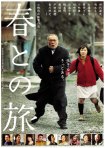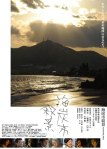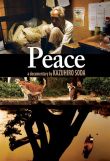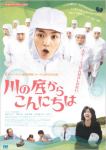Posts Tagged ‘Sakura Ando’
100en no koi / 100 Yen Love
 Even with a sharp script by Shin Adachi, director Masaharu Take doesn’t quite pull of the complex balance of something between an homage and a send-up of Million Dollar Baby – not quite getting the effective tragedy out of tragic-comedy. And bringing a questionable sensibility to what should be funny. The story of Kazuko (Sakura Ando), a loser taking her one shot in the boxing ring sends up the usual hero dynamic. Ando, who is being dangerously typecast for her ennui, spends half of the film as a misdirected cliché of a downbeat slacker, stuck working in a convenience store after escaping from her family and her largely unexplained dysfunctionality. Kazuko meets Kano (Hirofumi Arai), a washed up boxer and strangely unattractive individual, who needy person that she is, ends up with. This pushes her into her attempt at Rocky-ness and finding self worth. 100 Yen Love has several moments – the boxing ring scenes are great – and a lot of filler that keeps the viewer wondering what Take is up to.
Even with a sharp script by Shin Adachi, director Masaharu Take doesn’t quite pull of the complex balance of something between an homage and a send-up of Million Dollar Baby – not quite getting the effective tragedy out of tragic-comedy. And bringing a questionable sensibility to what should be funny. The story of Kazuko (Sakura Ando), a loser taking her one shot in the boxing ring sends up the usual hero dynamic. Ando, who is being dangerously typecast for her ennui, spends half of the film as a misdirected cliché of a downbeat slacker, stuck working in a convenience store after escaping from her family and her largely unexplained dysfunctionality. Kazuko meets Kano (Hirofumi Arai), a washed up boxer and strangely unattractive individual, who needy person that she is, ends up with. This pushes her into her attempt at Rocky-ness and finding self worth. 100 Yen Love has several moments – the boxing ring scenes are great – and a lot of filler that keeps the viewer wondering what Take is up to.
Originally published in EL Magazine, December 2014
0.5mm / 0.5 Miri / 0.5ミリ
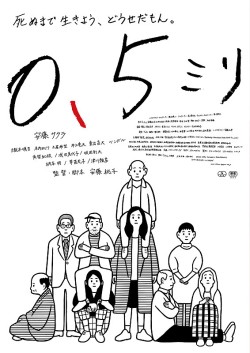 Momoko Ando’s second feature, 0.5mm shows that she’s grown, but not a lot since her pallid debut, Kakera. She adapted her own novel, creating an overlong picaresque tale of Sawa (Sakura Ando), a young woman caught up in the inequities of life and set adrift in the sad, strange world of geriatric Japan. It starts great. Sawa, working as a nurse, is cajoled into spending the night with her barely functioning keep. He gets a little horny and accidently gets set on fire. As she tries to save him he dies. She stumbles downstairs to find his daughter, her employer, has hung herself – her son staring in disbelief. Soon Sawa is on the road on her own, crossing with and taking advantage of a series of lost old men. Her adventures come to a full circle with an unconvincing denouement that closes up a family trauma and makes some vague statement about gender roles in Japan. Ando highlights some great actors, but little character development and 3+ hours make 0.5mm a challenge at best.
Momoko Ando’s second feature, 0.5mm shows that she’s grown, but not a lot since her pallid debut, Kakera. She adapted her own novel, creating an overlong picaresque tale of Sawa (Sakura Ando), a young woman caught up in the inequities of life and set adrift in the sad, strange world of geriatric Japan. It starts great. Sawa, working as a nurse, is cajoled into spending the night with her barely functioning keep. He gets a little horny and accidently gets set on fire. As she tries to save him he dies. She stumbles downstairs to find his daughter, her employer, has hung herself – her son staring in disbelief. Soon Sawa is on the road on her own, crossing with and taking advantage of a series of lost old men. Her adventures come to a full circle with an unconvincing denouement that closes up a family trauma and makes some vague statement about gender roles in Japan. Ando highlights some great actors, but little character development and 3+ hours make 0.5mm a challenge at best.
Originally published in EL Magazine, November 2014.
Ieji / The Way Home / 家路
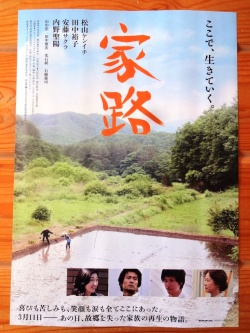 Nao Kubota’s premier feature, Ieji, has a great premise, a host of great actors and particularly cogent message for post 3.11 Japan, but falls flat in its unisnspired direction and its length. Not that Kubota’s heart isn’t in the right place. The story pits Jiro (Kenichi Matsuyama) and his brother, Soichi (Masaaki Uchino) against the reality of life in the shadows of the Fukushima meltdown. Jiro, young, single, with a troubled past has moved back within the no-man’s zone surrounding the stricken reactor to rebuild and replant. His older brother, Soichi, is still living in cramped temporary housing with his wife (Sakura Ando), daughter and mother (Yuko Tanaka). The conflicts around individual and collective responsibility, family ties and the future of Tohoku are given the perfect opportunity to be played out. Even with his incredibly fine cast, though, Kubota doesn’t give them much room to breathe deeply, though he give them plenty of Ozu-ish time to appear meaningful. Flat and flawed as it is, Ieji is still better than most films dealing with 3.11.
Nao Kubota’s premier feature, Ieji, has a great premise, a host of great actors and particularly cogent message for post 3.11 Japan, but falls flat in its unisnspired direction and its length. Not that Kubota’s heart isn’t in the right place. The story pits Jiro (Kenichi Matsuyama) and his brother, Soichi (Masaaki Uchino) against the reality of life in the shadows of the Fukushima meltdown. Jiro, young, single, with a troubled past has moved back within the no-man’s zone surrounding the stricken reactor to rebuild and replant. His older brother, Soichi, is still living in cramped temporary housing with his wife (Sakura Ando), daughter and mother (Yuko Tanaka). The conflicts around individual and collective responsibility, family ties and the future of Tohoku are given the perfect opportunity to be played out. Even with his incredibly fine cast, though, Kubota doesn’t give them much room to breathe deeply, though he give them plenty of Ozu-ish time to appear meaningful. Flat and flawed as it is, Ieji is still better than most films dealing with 3.11.
Originally published in EL Magazine, March 2014.
Kazoku no kuni / Our Homeland
 Director Yong-hi Yang, who has explored issues of her own Korean/Japanese family in documentaries, brings a fresh focus with her first feature fiction, Kazoku no kuni. The film follows the tale of Sonho (Iura Arata), a man who emigrated to North Korea from Japan in the 1970s, following an invitation to a better life there. In reality many Korean expats and Korean/Japanese did this from the 1950s through the 70s. In Kazoku no kuni he returns to Japan to get an operation, reuniting with his old family and particularly his sister, Rie (Sakura Ando). A powerful drama unfolds as Sonho tries to convince his sister to go to North Korea with him. The family dynamics are carefully etched with Yong-hi Yang’s sure direction. The leads, Ando and Arata, take on difficult and complex issues of nationalism, identity and family ties, giving them life through generous and deep portrayals. The supporting cast fills out the edges and details of this superbly crafted and heartfelt exploration of a little seen part of contemporary history.
Director Yong-hi Yang, who has explored issues of her own Korean/Japanese family in documentaries, brings a fresh focus with her first feature fiction, Kazoku no kuni. The film follows the tale of Sonho (Iura Arata), a man who emigrated to North Korea from Japan in the 1970s, following an invitation to a better life there. In reality many Korean expats and Korean/Japanese did this from the 1950s through the 70s. In Kazoku no kuni he returns to Japan to get an operation, reuniting with his old family and particularly his sister, Rie (Sakura Ando). A powerful drama unfolds as Sonho tries to convince his sister to go to North Korea with him. The family dynamics are carefully etched with Yong-hi Yang’s sure direction. The leads, Ando and Arata, take on difficult and complex issues of nationalism, identity and family ties, giving them life through generous and deep portrayals. The supporting cast fills out the edges and details of this superbly crafted and heartfelt exploration of a little seen part of contemporary history.
Originally published in EL Magazine, August 2012.
Torso / トルソー
 Longtime Koreeda cinematographer (Nobody Knows, After Life) Yutaka Yamazaki’s first directorial effort, Torso, plows some similar ground to Koreeda’s Air Doll, but to much different effect. Torso covers the relationship between 2 half-sisters. The older one, Hiroko (Makiko Watanabe) is an uptight, disengaged urban survivor, whose only relationship is with an inflatable male torso. Her secret life of bathing, frolicking and having sex with this headless, armless and legless prosthetic is rudely interrupted when her half-sister, Mina (Sakura Ando) – all extroverted enthusiasm and blabber – appears at her doorstep running from her abusive boyfriend, the one person, or rather body, that never physically appears in the film. The torso and continuing variations of objectified bodies – perfume bottles, pillows, a dress-making mannequin and a gravure idol – becomes the underlying leitmotif of this sensitively rendered portrait of how individuals come to terms with their issues and problems. The “strange” sexuality of blow-up doll attraction is rendered somewhat positively. Watanabe and Ando are perfectly cast and directed with a strained chemistry that once binds and separates them.
Longtime Koreeda cinematographer (Nobody Knows, After Life) Yutaka Yamazaki’s first directorial effort, Torso, plows some similar ground to Koreeda’s Air Doll, but to much different effect. Torso covers the relationship between 2 half-sisters. The older one, Hiroko (Makiko Watanabe) is an uptight, disengaged urban survivor, whose only relationship is with an inflatable male torso. Her secret life of bathing, frolicking and having sex with this headless, armless and legless prosthetic is rudely interrupted when her half-sister, Mina (Sakura Ando) – all extroverted enthusiasm and blabber – appears at her doorstep running from her abusive boyfriend, the one person, or rather body, that never physically appears in the film. The torso and continuing variations of objectified bodies – perfume bottles, pillows, a dress-making mannequin and a gravure idol – becomes the underlying leitmotif of this sensitively rendered portrait of how individuals come to terms with their issues and problems. The “strange” sexuality of blow-up doll attraction is rendered somewhat positively. Watanabe and Ando are perfectly cast and directed with a strained chemistry that once binds and separates them.
Originally published in EL Magazine, July 2010
Kenta to Jun to Kayo-chan no Kuni / ケンタとジュンとカヨちゃんの国 / A Crowd of Three
 A Crowd of Three begins follows the story of Kenta (Shota Matsuda) and Jun (Kengo Kora), two brutalized and brutal buddies who decide to break free from their dead-end jobs and hit the road in a stolen truck to find Kenta’s imprisoned brother. A pivotal scene when they decide to make their getaway frames them amidst unfinished expressways, telegraphing their fool’s errand. Though Matsuda and Kora are uniformly good in their roles, the machinations of the story, unconvincing psychology and an unrepentant misogyny begin to the cripple the film. Even the usually brilliant Sakura Ando as the simpering and continually abused girlfriend, Kayo-chan is left only with a set of mannerisms to carry her role. As the film unravels, moments of downbeat sentiment surface, particularly when they finally make it to see the prison-broken brother. However, director Tatsushi Omori (Whispering of Gods) throws it all away with not one, but two endings. This plot device, popular among many young Japanese directors, rarely works and certainly doesn’t with A Crowd of Three.
A Crowd of Three begins follows the story of Kenta (Shota Matsuda) and Jun (Kengo Kora), two brutalized and brutal buddies who decide to break free from their dead-end jobs and hit the road in a stolen truck to find Kenta’s imprisoned brother. A pivotal scene when they decide to make their getaway frames them amidst unfinished expressways, telegraphing their fool’s errand. Though Matsuda and Kora are uniformly good in their roles, the machinations of the story, unconvincing psychology and an unrepentant misogyny begin to the cripple the film. Even the usually brilliant Sakura Ando as the simpering and continually abused girlfriend, Kayo-chan is left only with a set of mannerisms to carry her role. As the film unravels, moments of downbeat sentiment surface, particularly when they finally make it to see the prison-broken brother. However, director Tatsushi Omori (Whispering of Gods) throws it all away with not one, but two endings. This plot device, popular among many young Japanese directors, rarely works and certainly doesn’t with A Crowd of Three.
Originally published in EL Magazine, May 2010
